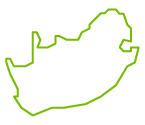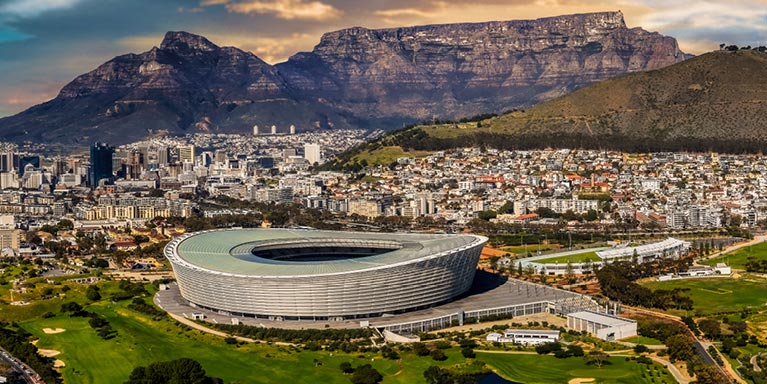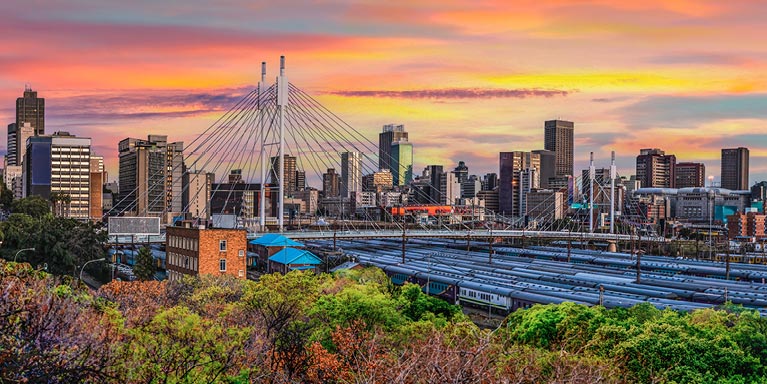
A guide to South Africa
Our expert view on expat life in ‘Mzansi'

With a fantastic climate, stunning nature and an outdoor lifestyle, South Africa is a popular destination for expats from around the world. It has a reputation for being friendly and most people speak fluent English – even though it’s just one of the 11 official languages. The country’s financial and political centres of Johannesburg, Pretoria and Cape Town tend to attract the most expats.
In this guide, we’ll look at the things that are good to know to help you quickly settle into your new lifestyle. And, if you’re thinking of moving abroad, we’ll be by your side as you embark on your latest adventure.
- Population: 60 million
- Currency: South African rand (ZAR)
- Capital: Cape Town (legislative), Pretoria (executive), Bloemfontein (judicial)
- Biggest city: Johannesburg
- Main language: 11 official languages with English most commonly used, but Afrikaans, Xhosa and Zulu are also widely spoken
- Main religion: Christianity
- Political system: Constitutional parliamentary republic
- International dialling code: +27
- Emergency services: Dial 10111 for police, 10177 for ambulance services
- Driving: On the left, like the UK
-
Careers
South Africa is an emerging market with a strong economy, albeit quite volatile due to rapid changes. The country has a high rate of unemployment, but there’s a skills shortage in sectors such as education and engineering, where many job opportunities are created for expats. There’s a strong entrepreneurial spirit, paying taxes is straightforward, hard work is valued and there are incentives for investors. One legacy of apartheid is that unions are influential and labour unrest is often cited as a barrier to investment in the country.
Business has a clear management hierarchy and showing respect for senior colleagues is important. Face-to-face meetings are preferred, with people greeting each other with a handshake and by first names.
Salaries are usually lower than in many Western countries, but if you can get paid in a stronger currency than the rand, your money will go much further, especially with the lower cost of living.
Education
There are significant disparities between public and private education – only the very affluent can afford private schools. The school year runs from January to December with the main breaks in June/July and December/January. Within the government-funded public schools, the standards can vary, especially in less affluent underfunded areas, and teachers are underpaid. Schools in wealthier areas tend to have better resources and subsequently offer a better level of education.
The private schools are excellent, but expensive, and there’s stiff competition for places. Many of these schools are faith-based, and some use alternative teaching methods such as Montessori and Waldorf.
Homeschooling has become more popular among expat parents, but you must register your child and apply to the head of the Department of Education in your province. Your lessons must comply with the basics of education that they define.
There are also several international schools in Cape Town and Johannesburg that mainly follow American, British, French, or German curricula or the International Baccalaureate.
-
Moving money
Putting the right banking arrangements in place is vital for expats around the world. You want to be able to access and transfer money easily, and with a bank you can trust to comply with international regulations. Most people have two banks – one in their home country and one local to where they’re living. But, if your bank has a global network, you may be able to set up an account ahead of your arrival, which gives you time to assess the financial market.
It’s important to understand how foreign exchange works and how fluctuating exchange rates can affect you. When you’re juggling finances in multiple currencies, remember that the currency markets can move quickly and make a big difference to the value of your money.
To help you reduce the risk of fluctuating currency, you could choose a foreign exchange that lets you fix an exchange rate for a fixed period. Then you’ll know exactly how much you need to convert, whatever happens in the market.
Budgeting
When you’re looking to move to a new country, you need to consider how a change in the cost of living could affect your finances. In South Africa, it’s generally lower than in the UK and US, but the cost of everyday expenses like groceries and electricity is increasing due to the weakening of the rand. If you’re paid in a stronger currency, you’ll probably have more disposable income than you did back home.
If you’re moving with your job, sometimes your employer may help with expenses, such as accommodation or school fees. Remember to account for setup costs, such as buying furniture and arranging insurance, when you’re thinking about your budget.
Costs
Some of our offshore accounts have a monthly fee, such as the International Current Account, whereas others, like the Premier International Account, don’t. Both offer fee free International Payments (correspondent and recipient bank charges may apply) and 24/7 worldwide access. Plus, the Premier also includes worldwide travel insurance for you and your family, which is underwritten by AWP P&C SA and administered by Allianz Assistance, which is a trading name of AWP Assistance UK Ltd. Eligibility criteria, terms and conditions apply.
Financial planning
While it’s going to be a busy time, it’s also worth setting some time aside to review your financial plans, such as whether you want to open any offshore accounts. They offer the convenience of keeping your money in one place so you can stay with the same bank no matter where life takes you.
Your expat status could give you new opportunities that weren’t available to you at home. However, tax rules differ from country to country, so if you’re unsure about your personal tax obligations, you should seek professional advice.
Lloyds Bank International Private Banking is by your side every step of the journey as you start your new life abroad. We offer international knowledge, experience and dedicated expert support to help meet all your financial needs. From savings to international payments and transfers, we can help you navigate the complex world of wealth management away from home.
Security
Offshore accounts are not protected by the Financial Services Compensation Scheme (FSCS), which protects savings up to £85,000 with authorised UK banks and building societies.
However, our accounts are covered by other schemes. The Jersey Bank Depositor Compensation Scheme, the Isle of Man Depositors’ Compensation Scheme and the Guernsey Banking Deposit Compensation Scheme offer protection for eligible deposits of up to £50,000.
Tax and legislation
Individuals resident in South Africa are subject to tax on their worldwide income. Non-residents are subject to tax on income from South African sources. The source of payment usually relates to the rendering of services in that location, so short-term visits of less than three weeks do not generally result in South African tax liability if the individual’s presence is incidental to continuing employment elsewhere, and if the income falls below the annual tax threshold. Under existing law, income tax becomes payable if an individual earns more than 83,100 ZAR (3,407 GBP or 4,335 USD) per year.
- Employment income – the basis of employee taxation is remuneration, consisting of salary, leave pay, allowances, wages, overtime pay, bonuses, gratuities, pensions, superannuation allowances, retirement allowances and stipends, whether in cash or otherwise. These payments, together with the cash value of any fringe benefits received, form part of the gross income of an employee.
- Self-employment and business income – professional fees paid to non-residents are subject to employee withholding tax (if from a South African source), even if the non-resident is an independent contractor. Business losses of a self-employed person may be carried forward indefinitely if the trade is continued. No loss carry backs are permitted.
- Investment income – foreign dividends on holdings of less than 10% that are paid to residents are taxable, subject to the provisions of an applicable double tax treaty.
- Taxation of employer-provided stock options and other incentive plans – the difference between the market value of shares and similar rights as of the date of vesting for tax purposes and the consideration given by the employee is taxed in South Africa if, in the case of non-residents, the incentive is for services rendered in South Africa. Residents are taxable on the whole gain, regardless of source, unless they are exempt under the foreign employment income exemption.
- Estate duty and donations tax – levied at a flat rate of 20% on net assets at death and all capital transfers. Residents are subject to estate duty and donations tax on worldwide assets, except for offshore assets acquired by inheritance or donation from a non-resident or owned before becoming resident. To prevent double taxation, South Africa has entered estate tax treaties with six countries.
- Transfer duty – levied on the acquisition of fixed property with a value exceeding 1 million ZAR. The rate of the duty on property with a value exceeding 1 million ZAR depends on the purchase price of the property with a maximum rate of 13%.
- Social security – limited unemployment insurance and accident or illness benefits are provided with employers and employees both contributing 1% of the employee’s remuneration.
The tax authority is the South African Revenue Service (SARS) and the tax year runs from 1 March to 28/29 February, with the tax return date of 16 November for non-provisional tax payers and 31 January for provisional tax payers. See www.sars.gov.za for further information.
Accommodation
South Africa has a wide choice of accommodation, with gated communities particularly popular among expats. Many expats on long-term contracts choose to buy rather than rent, especially when the rand is weak. Generally, property is much cheaper than in the UK (around 83% cheaper per square metre if you’re buying an apartment), both in and out of the major cities.
Those wanting to rent will have a choice of furnished or unfurnished properties and estate agents will help make the process straightforward. Lease terms are usually for a year. You’ll need proof of income and a security deposit of one or two-months’ rent. Utilities are rarely included, and electricity is often prepaid.
If you’re concerned about crime and security, consider selecting a home with a perimeter fence, security gates and an alarm system linked to a private security firm.
The largest cities, Johannesburg, Cape Town and Durban, attract expats because of the greater job opportunities. Each offers a unique combination of culture, activities and natural beauty, with a diverse population and growing expat community.
Johannesburg is the largest city and a major financial hub; Cape Town has a Mediterranean climate, stunning coastlines and scenery; while Durban boasts the best beaches.
Arts
South Africa boasts some of the oldest artwork in the world, dating back to caves 75,000 years ago. The Khoisan tribe from around 10,000 BC had their own styles seen in cave paintings. Then came Dutch-influenced works and, during apartheid, ‘township art’.
Oral poetry has a great tradition in South Africa, particularly as written literature was often banned.
Kwaito is a popular genre of music that emerged in the mid-1980s and has become a political and socio-economic force. Rock music is also big in certain regions, notably Johannesburg.
Culture
South Africans are known for their friendliness. You’ll be made very welcome and soon feel at home – especially if you enjoy sport. Cricket, football and rugby are the most widely played, while basketball is becoming increasingly popular.
South Africans can be direct, and they prefer simple language. They value politeness and strive for consensus, often using humour as an icebreaker or to diffuse tension.
Food
South African cuisine is heavily meat-based and therefore barbecues are a commonplace social gathering (‘braai’). They usually feature boerewors or spicy sausages, and mielies (maize). Indian food is popular, especially in Durban with its large Indian population. Pastries, such as koeksisters, and desserts like melktert (milk tart) are also highly favoured.
South Africa is now a major wine producer, with production mainly concentrated around Cape Town, so you’re sure to have something tasty to help wash down the hearty food.
Health
Private and public health systems exist in parallel in South Africa, but there’s a huge gap between them, so you’ll probably want to take out medical insurance to cover the consultation costs of private hospitals and clinics.
Private policies vary in price, so it’s a good idea to shop around for cover both locally and internationally. In 2024, the general cost was around 1,000 to 2,000 ZAR (4.10 GBP/5.22 USD to 8.20 GBP/10.44 USD) per month for a family of four, although costs are higher for comprehensive cover and the elderly.
Many companies offer lower rates or pay 50 per cent of employees’ health insurance costs.
The medical staff at public hospitals are fantastic, but the facilities are often poor due to underfunding and vary from region to region. Queues can be long, and charges are based on income. There are around 200 private hospitals across the country and, as a fee-paying customer, you should be able to see a doctor or specialist quickly rather than waiting several weeks.
Pharmacies are usually attached to hospitals and clinics, and in most shopping malls. If you’re travelling to a remote area, take a supply of medication with you because the nearest pharmacy could be far away. You’re allowed to bring a three-month supply of medication with a letter from a doctor in your home country.
The ambulance service can be slow in rural areas, so again a private ambulance, covered by your medical insurance, is probably advisable.
Pets
To bring a pet to South Africa, you’ll need to apply for an import permit issued within a few working days. Make sure that your pets are microchipped and vaccinated. Get a health certificate from a vet within 10 days of your flight.The rabies vaccination should be given at least 30 days before the import date and no longer than a year. Dogs must also have blood tests within 30 days of the export date and dogs from some countries are quarantined for two weeks, as are any pets not meeting entry requirements.
Restricted items
Prohibited items include drugs and narcotics, weapons, cigarettes over 2kg, poison, tea and toxic substances. Any meat or fish products must have a certificate from the Department of Agriculture, Forestry and Fisheries.
Shipping
South Africa has a complex import process. Shipping costs are usually high due to the long distance, and you may have to pay duty on certain items. The South African Revenue Service (SARS) lists nearly 90,000 product tariff codes that are strictly enforced on all imports. Make sure you fill out all necessary documentation and customs declarations correctly. Air freight is quicker than sea, and often offers a door-to-door service, but it’s much more expensive.
Transport
Most expats own a car, although fuel and maintenance costs are expensive. Urban roads are generally in a good state, but those in rural areas can be poor. Traffic congestion can cause delays in rush hour and power outages often cause problems on the roads. Your driving licence from home is valid to use if it’s in English and has your photograph.
Taxis are found in most big cities, although they can be expensive. There are also minibus taxis, but they’re often in poor condition and can be a bit dangerous. App services, such as Uber and Bolt, are also available in most urban areas.
In terms of public transport, bus services are limited and mainly cover areas where expats don’t live. There are some long-distance services between the main cities and towns, but they’re often overcrowded and incredibly slow.
Trains aren’t widely used in South Africa, but they do run in the larger cities. The Gautrain MRT rapid rail system connects Pretoria to various places in Johannesburg, such as the airport and business district. The trains are safe, clean and efficient, but the route is limited. Luxury services such as Blue Train, Premier Classe and Rovos Rail give you the chance to enjoy spectacular scenery in comfort if you’re travelling long distances.
Due to the size of the country, the best way to travel between cities is to fly. Many airlines operate regular domestic flights, along with flights to neighbouring countries.
Lloyds Bank International takes no responsibility for the accuracy of this information. It is provided for orientation purposes and to stimulate further research, not as advice. We advise that you independently verify any details and make decisions based on your own assessment. It is crucial you are aware of and comply with any relevant laws in your host country or country of origin.

Cape Town
Cape Town is the legislative capital of South Africa and is popular for its Mediterranean climate, cultural events, stunning coastlines and scenery. The city attracts tourists from around the world to take in the natural beauty of the harbour, Table Mountain, Cape Point and its setting within the wider Cape Floristic Region.

Johannesburg
The largest city and major financial hub, Jo’burg grew from the mineral-rich hills that surround it. Despite having a population of nearly 5 million, it’s one of the greenest cities in the world with 6 million trees and growing every year. With a wide range of cultural venues, many creative industries and art schools have thrived in the area.